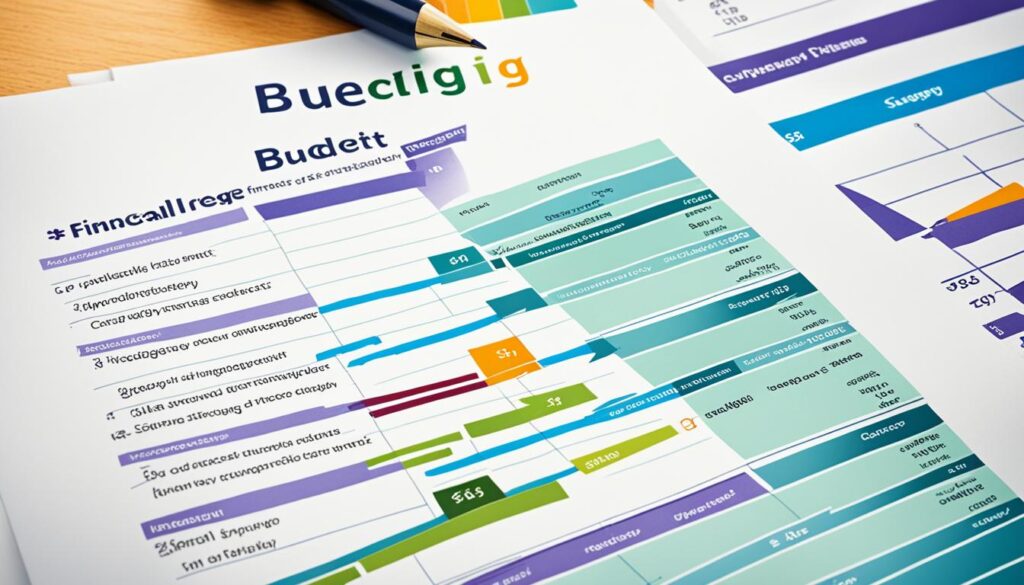Understanding the benefits-of-budgeting is crucial for smart money management. It’s the foundation for achieving financial stability and comfort. By adopting personal finance tips and realizing the importance of budgeting, you pave the way for monetary control.
A strong emergency fund brings peace of mind. Effective financial planning leads to transformation. With the right budgeting strategies, you can save money and live within your means. This is key for lasting prosperity.
For beginners, budgeting is not just about numbers; it’s a step toward financial freedom. Embracing budgeting for beginners opens the door to wise money management. Let’s explore how budgeting can be a powerful tool for financial success.

Key Takeaways
- Unlocking the potential of personal finance through the power of budgeting.
- Discovering the transformative impact of strategic money management.
- The essential role budgeting plays in navigating towards a secure financial future.
- Adopting budgeting techniques that promote saving and curtail unnecessary expenditure.
- The liberating experience of aligning lifestyle choices with financial capabilities.
- Gaining a holistic understanding of the advantages of structured financial planning.
Introducing the Matchmaker of Personal Finance: Budgeting
Think of budgeting as your personal finance matchmaker. It brings your income and expenses together, leading to financial stability. It’s like going on a first date with success when you learn the importance of budgeting. This tool is key to mastering your money.
For those new to managing money, budgeting for beginners is essential. It helps you understand where your money comes and goes. You can then make smart decisions for your future.
- By budgeting, you ensure every dollar works hard, bringing budgeting advantages such as less waste and more savings.
- Getting good at budgeting helps you set and reach realistic financial goals.
- Budgeting guides your money toward things like emergency funds, retirement accounts, or vacations, making these goals a key part of your finance talks.
Budgeting is a tool that lights the way to better personal finance tips. It helps you see how choices affect your financial goals.
View budgeting as a helpful financial coach, not a limit. It helps control spending, line up expenses with priorities, and live within your means. This highlights the importance of budgeting. It’s crucial for building a strong financial future.
Start this journey with courage. Mastering budgeting helps you control your financial destiny and opens up new possibilities. Budgeting for beginners turns financial challenges into tasks you can manage. It sets you up for a lifetime of financial health.
Emergency Preparedness: Weathering Financial Storms with a Budget
To build a strong financial plan, we must think ahead and plan carefully. At the heart of this planning is emergency preparedness. This means getting ready for unexpected costs that could hit your finances hard. A good budget isn’t just about tracking money coming in and out. It’s about preparing to weather any financial storms that may come your way. Let’s explore how smart budgeting can keep you financially stable during tough times.
Creating a Safety Net Through Budgeting
Building an emergency fund is key to a secure financial future. By using budgeting strategies wisely, you set aside some of your earnings. This money forms a safety net for tough times. An emergency fund is crucial for keeping your finances steady and strong. It protects you from financial surprises that could throw your life off course.

How a Budget Can Cushion Life’s Unexpected Blows
A well-thought-out budget gives you strength against life’s financial surprises. It helps with sudden costs like medical emergencies or losing a job. With a budget, you can handle these situations without messing up your long-term money goals. Being prepared like this helps you stay calm and financially stable during crises.
A budget is more than a way to respond to problems. It’s a proactive tool for managing through tough times with skill and confidence. By setting money aside for budgeting for emergencies, you’re not just avoiding potential problems. You’re also investing in your peace of mind. This approach ensures you maintain a good life quality, even in uncertain economic times. Choosing emergency preparedness in your budget protects you from unexpected expenses. It also gives you control over your financial future.
The Road to Retirement: How Budgeting Paves the Way
Planning for retirement means learning how to budget wisely. It’s key to a happy and financially secure future. Good retirement savings strategies take time, effort, and understanding of financial planning. Retirement budgeting is more than just saving money. It means making smart retirement savings choices now. This is how you ensure a brighter future for yourself.
Budgeting for a Secure Future
Having a retirement budgeting plan is crucial. It lets you set long-term goals and find ways to meet them. With regular retirement savings, you can invest in options that grow your money. This way, you’ll be set when it’s time to retire. Thinking about travel or healthcare? A good plan puts you in control of your money.

Strategies to Boost Your Retirement Savings with Budgeting
To grow your retirement savings, you need retirement budgeting strategies. Start by spending less on things you don’t need. Put that money into your retirement instead. It really adds up over time. And don’t forget about making the most of your retirement contributions.
Using accounts like 401(k)s and IRAs can increase your savings. Employers often match what you put in, giving you more for retirement. Keep checking and tweaking your plan. This commitment is key to enjoying your later years.
“It’s not just about saving; it’s about saving wisely. Retirement planning is a long-term commitment that begins with a strategic budget and ends with a fulfilling retirement.”
Correcting Course: Budgeting as a Tool to Fix Bad Spending Habits
Overcoming harmful spending patterns is vital for financial health. It takes solid financial discipline and smart budgeting strategies. To fix bad spending, we must find and cut unnecessary costs. Also, pairing an effective budget with mindful spending helps control spending. It aligns with personal goals.

Moving to thoughtful buying needs careful thought on every money choice. Keeping track of expenses and finding patterns make budgeting enlightening. This shows where money is wasted and the reasons behind it. Insight gained is crucial for positive financial changes.
To practice mindful spending with budgeting, here’s a simple plan:
- Analyze current spending to see what’s wrong.
- Set realistic financial goals for saving and cutting debt.
- Allocate money wisely for needs, savings, and wants.
- Keep updating the budget as your money situation changes.
Here’s an example of a monthly budget check to fix unhealthy spending habits:
| Category | Planned Spending | Actual Spending | Variance | Action Steps |
|---|---|---|---|---|
| Groceries | $500 | $450 | -$50 | Continue mindful grocery shopping. |
| Dining Out | $150 | $250 | +$100 | Reduce eating out, plan meals at home. |
| Entertainment | $100 | $200 | +$100 | Evaluate entertainment choices, look for free events. |
| Miscellaneous | $75 | $100 | +$25 | Prioritize needs over wants. |
Fixing spending habits is more than just cost-cutting. It means aligning finances with personal values. Budgeting strategies guide us towards more meaningful financial choices. Staying disciplined and consistent transforms budgeting into a key for long-term financial health and mindful spending.
Empowering Financial Control: The Oversight Budgeting Provides
Budgeting is more than just tracking income and expenses. It is a powerful tool for financial control and cash flow management. With budgeting strategies, individuals can make wise financial choices. This leads to a stable economic future.

Understanding Your Cash Flow
The key to budgeting for cash flow is understanding money flow. Knowing where money comes from and where it goes is crucial. Through cash flow management, people learn about their financial habits. This knowledge aids in optimizing financial control.
Making Informed Financial Decisions
Think of budgeting as a financial map. It helps make informed decisions by showing your financial landscape. With a budget, choices are based on clear understanding. This includes knowing what resources are available, future needs, and using budgeting strategies for better financial control and freedom.
Living Within Your Means: The Freedom of Affordability
Starting with financial responsibility means adopting solid budgeting strategies. These strategies help you spend within your limits. Living according to what you can realistically afford brings financial freedom and stability. The idea is simple yet powerful: avoid debt and encourage debt prevention.

Preventing Debt with Proactive Budget Management
Managing your budget wisely is key to budgeting for debt management. It prevents spending more than you earn. This careful budgeting ensures you live within your means. By planning your expenses, you can avoid debt and keep your spending in check with your income.
Aligning Spending with Income through Budgeting
Being mindful about spending as much as you earn is crucial. Budgeting for affordability is more than limiting yourself; it’s about making smart choices. This wisdom is fundamental for living a life that’s both enjoyable and financially sustainable.
| Income Bracket | Essential Expenses | Discretionary Spending | Savings Contributions |
|---|---|---|---|
| $25,000 – $45,000 | 50% | 20% | 30% |
| $46,000 – $65,000 | 45% | 25% | 30% |
| $66,000 – $85,000 | 40% | 30% | 30% |
| $86,000+ | 35% | 35% | 30% |
Cultivating Family Harmony with Fiscal Responsibility
Keeping track of money is key to a happy family life. By planning spending, families can handle money issues together. It’s important to teach everyone in the family about money. This way, they can all contribute to keeping finances under control.

Lessening Domestic Tensions by Managing Money
Money worries can make families argue. But knowing how to manage money can help. If everyone knows what’s going on with the finances, there’ll be fewer fights. Making decisions together helps keep the peace.
Teaching Financial Literacy within the Household
Learning about budgeting is very valuable. It helps everyone, young and old, make better money choices. This teaches them to be responsible with money now and in the future.
- Develop family-centered budgeting strategies to involve all members.
- Organize regular meetings to discuss financial matters and progress.
- Provide resources and tools to enhance financial literacy within your household.
To sum up, when families work together on finances, they build a stable future. Creating a culture of learning and working together helps everyone. It’s good for each person and the family as a whole.
Mental Health and Financial Clarity: benefits-of-budgeting
The link between mental health and financial stability is strong. The benefits of budgeting are not just about money. It also gives us financial clarity, which helps reduce stress and money anxiety. Budgeting shows us our financial future and supports our mental health.
Talking about budgeting for mental health means addressing money-related stress in a positive way. It helps create an organized financial life and peace of mind. This makes us feel calm and in control.
Alleviating Money-Related Anxiety
Financial worries cause fear and stress for many. But, budgeting helps by laying out our income and expenses clearly. It turns chaos into order, giving us peace. This way, budgeting for mental well-being becomes a key method to handle financial ups and downs.

The Mental Relief of Organized Finances
Knowing our finances are in order brings tranquility. Organized finances let mental health thrive without the fear of surprise bills or debt. This freedom from money worries allows us to enjoy life more.
This shows that budgeting is crucial for a happy life, not just for managing money. By aiming for financial stability, we tap into budgeting’s power for mental well-being.
Your Blueprint for Financial Success: Crafting a Budget
Starting your financial success journey begins with a detailed plan. A well-made budget is key to this process. Like a blueprint for a building, a budget is the foundation for your financial goals. It’s about balancing your money wisely, making sure each dollar is spent purposefully.
Creating a budget is more than just playing with numbers. It’s a deep strategy for guiding your financial journey. By looking at your finances and setting clear goals, you’re laying down the foundations for wealth. With a budget, you can adjust your plan to make sure you’re spending in line with your dreams. This helps you focus on what’s truly important.
It’s crucial to keep an eye on your financial growth. Every tweak in your budget boosts your confidence. As you make smart choices, you see your financial dreams become real. A budget doesn’t just help manage your money. It carries your goals and leads you to financial stability and peace.